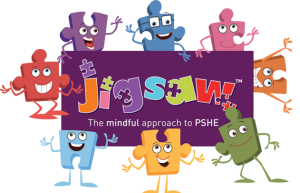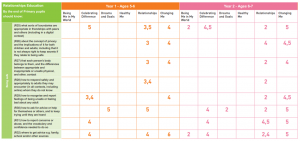Personal, Social & Health Education
Intent
Our vision for Personal, Social and Health Education (PSHE) is for every child to be equipped with the necessary skills to become healthy, independent and responsible members of society. We aim to help our pupils understand how they are developing personally and socially, and tackle many of the moral, social and cultural issues that are part of growing up through high quality teaching and consistently reinforcing our school values.
Implementation
PSHE is taught through a detailed and comprehensive scheme called Jigsaw. This includes statutory Relationships and Health Education in a spiral, progressive and fully planned scheme of work. It gives children relevant learning experiences to help them navigate their world and to develop positive relationships with themselves and others.
Jigsaw consists of six half-term units of work (Puzzles), each containing six lessons (Pieces) covering each academic year.
- Term 1: Being Me in My World
- Term 2: Celebrating Difference (including anti-bullying)
- Term 3: Dreams and Goals
- Term 4: Healthy Me
- Term 5: Relationships
- Term 6: Changing Me (including sex education)
Impact
We prepare our children for life, helping them to really know and value who they are and understand how they relate to other people in this ever-changing world.
We believe it is important to educate and raise awareness of key topics such as anti-bullying week, e-safety, and road safety to highlight ways of preventing and responding. We also believe it is important to consistently celebrate each other’s achievements.
Every Friday we hold a Celebration Assembly where we recognise any special achievements, awards, or events. Additionally, we have weekly mindfulness assemblies where the children practise breathing exercises. This supports us in building a strong community at our school.
Sex & Relationship Education
Relationship, Sex and Health Education (RSHE) is seen by the whole school community as an important part of a child’s development. It is part of lifelong learning about the emotional, social and physical aspects of growing up, relationships, sex, human sexuality and sexual health. We emphasise our focus on teaching our pupils about relationships and health.
Children need to expand knowledge and skills in order to make informed decisions. RSHE supports the statutory social, moral, spiritual and cultural development of a child and is also a key aim of the national curriculum to prepare children for life.
Why is Relationship, Sex and Health Education important?
RSHE is an integral part of PSHE and ensures that pupils receive the appropriate information, develop skills, and explore attitudes about changes to their bodies and relationships.
RSHE outcomes will also be addressed in other parts of the wider and National Curriculum. For example, National Curriculum Science outcomes include naming body parts, understanding the human life cycle and human reproduction, and Religious Education includes work on families and values. Effective RSHE is integrated across the curriculum but it is also important to deliver some identified RSHE lessons so that pupils can learn about the human life cycle in the context of learning about the changes that will occur within themselves, as well as their relationships.
How do you deliver RSHE?
We use Jigsaw, the mindful approach to PSHE, as our chosen teaching and learning programme and tailor it to the children’s needs.

Jigsaw is fully compliant with the DfE Statutory Relationships & Health Education Guidance. The way the Jigsaw Programme covers these is explained in the mapping document (see example below):

Whilst the Relationships unit in Jigsaw covers most of the statutory Relationships Education, some of the outcomes are also taught elsewhere in Jigsaw (e.g. the Celebrating Difference Puzzle helps children appreciate that there are many types of family composition and that each is important to the children involved). This holistic approach ensures the learning is reinforced through the year and across the curriculum. In addition, RSHE is delivered through other areas of our curriculum including Science, RE, PSHE and Literacy.
We use a range of teaching methods which involve children’s full participation, these include the use of videos, discussions and drama, all with a great focus on relationships. (Please see our policy for more information.)
The plans are age specific with relevant content for children of all ages. Sessions are sequenced to promote progression and teachers consider whether plans need adapting for classes, especially for those who have not yet received RSHE learning. Adapting sessions also involve consolidating prior learning before delivering new content to the children. We teach our pupils to be mature and respectful about content, ideas, opinions, and discussions whilst enabling a safe space to openly discuss topics about relationships that are driven by the children’s interest.
How do respond to children’s questions?

Because children are all different and will ask different questions at different ages, questions and answers are not categorised by the age of the child; we start with a simple answer and build from that.









